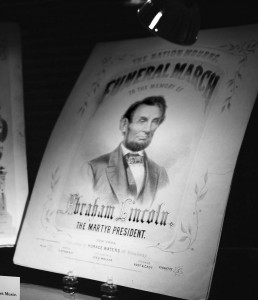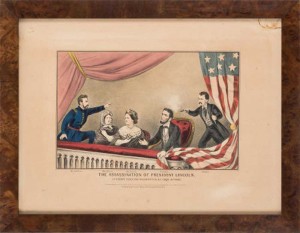
“I don’t want to talk about money,” Greg Dow said on a recent afternoon, standing behind the counter at his art gallery.
The Lincoln auction was still two days away. Greg was hoping the collection would bring big bucks. But, while friendly, Greg isn’t as extroverted as his father was. He’s studious, hardworking, and low-key. He sought no media attention and preferred not to discuss his dad’s collections at all.
The Dow family stretches back five generations, to a farming and ranching operation they established west of Fort Worth in 1876. He became more relaxed when discussing his family history.
“They had 975 acres in south Palo Pinto County, north of Mineral Wells,” he said. “They moved here from Louisville, Kentucky. My great-great-great grandfather, Timothy Dow, came with his son and got into farming and ranching.”
A severe drought wiped out third-generation rancher Percy Dow in the early 1920s, and he and his wife, Nell, looked for something new in the big city.
“My grandmother said, ‘Let’s move to Fort Worth and see if we can do any good there,’ ” Greg said. “They were young and didn’t have any money.”
Each generation of Dows had at least one family member interested in painting; the artistry bug kept getting passed down. Nell became an excellent painter and saw her works displayed at many regional shows in the 1920s and 1930s.
Percy wasn’t a painter, but he took a job making frames at Collins Art Co., the premier frame shop in Fort Worth at the time. His work ethic, learned from farming and ranching, served him well, especially when the Great Depression sank the economy in the 1930s.
When Collins Art Co. announced salaries would be cut due to tough times, Percy struck out on his own. Brown Frame Shop, a nearby competitor, was owned by an elderly man ready to retire. Percy bought him out in December 1934 and reopened the business as Dow Art Galleries in 1935.

“My granddad was a small, wiry guy, and he loved to work,” Greg said. “He would work 14 to 16 hours a day. He was always afraid he might not be able to make it, so he needed to work harder. It was tough times. Picture framing was not something people really needed. It was a luxury item.”
Any worries that Percy had about striking out on his own quickly abated. Legendary Fort Worth publisher Amon Carter bought the Hotel Texas around that time and decided to redecorate. He wanted three prints mounted, framed, and hung in each room. The contract fell to Percy, which gave him much-needed income at a crucial time. And working with Carter helped introduce Percy to many members of Fort Worth’s social elite, who had discretionary income to spend on paintings and fine frames.
“We did most all of Amon Carter’s framing for about 20 years, until he passed on,” Greg said.
The business was a family affair. Nell Dow became adept at cleaning and restoring paintings. A young Don Dow picked up his mother’s painting skills, and he too would become an excellent restorer.
Percy was a hard worker but snake-bitten when it came to choosing locations. The first shop was downtown on Houston Street. But that building underwent a major remodeling in 1939, and tenants were forced out. Percy leased a building on Monroe Street, but that spot was torn down in the early 1950s to make way for the Fritz G. Lanham Federal Building. Percy leased a new location on Throckmorton Street, where the store remained for 17 years.












Just noticed this really great story about Mr. Dow. Thanks for bringing it to our attention. He was my friend for many years, but you told me things I didn’t know. Informative and entertaining. I have shared this article with dozens of art collectors in Texas and they have all thanked me for doing so. Keep up the good work.